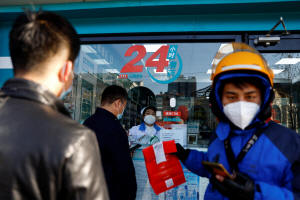Chinese rush to stock up antigen kits, medicines as COVID prevention
curbs ease
 Send a link to a friend
Send a link to a friend
 [December 06, 2022]
By Sophie Yu and Brenda Goh [December 06, 2022]
By Sophie Yu and Brenda Goh
BEIJING (Reuters) - Chinese residents have rushed to snap up COVID-19
antigen kits and medicines for fevers and colds, as the country's recent
easing of prevention measures triggered widespread concern among the
public that they could now catch the virus.
Online medicine platforms, pharmacies and drugmakers have in recent days
reported surging sales, with JD Health saying that sales of antigen test
kits jumped 344% in the week between Nov. 28 and Dec. 4 from the
previous week.
"People around me are all buying antigen kits and I also bought 50,"
said 40-year-old Beijing resident Huang Yuqi, working for an
entertainment company.
"Now the country is entering a new phase in terms of pandemic policy and
I'm unsure about what will happen next. We can only try to protect
ourselves, so I'm also buying N95 face masks, Tylenol and Ibuprofen."
A shop assistant at the Tongzhitang Dongdan drug store in downtown
Beijing told Reuters they sold out of fever medication on Monday. "I
have never seen so many customers come to buy fever medication in one
day," he said. "We are trying to refill our shelves but it may take a
week."
On Monday, the market regulator in Beijing issued a warning against
hoarding and hiking prices for epidemic prevention products, including
anti-virus drugs, masks and disinfection and sterilization merchandise.

The surge in demand has driven up share prices in medicine
manufacturers, with cough syrup producer Guizhou Bailing, and Xinhua
Pharmaceutical, which makes 40% of all Ibuprofen sold in China jumping
between 8-10% on Tuesday.
China's strict adherence to its zero-COVID policy over the last three
years has kept its general public largely insulated from the waves of
infection that whipped around the wider world.
By global standards, China suffered far fewer cases and deaths, but the
economy paid a price for the tough restrictions on movement.
Authorities finally started to ease some of the toughest restrictions
after the public's frustration boiled over late last month with a wave
of protests that marked the strongest show of dissent since Chinese
President Xi Jinping came to power a decade ago.
[to top of second column]
|

People line up to buy fever and cold
medicine as a delivery worker picks up an order at a pharmacy, amid
the coronavirus disease (COVID-19) outbreak, in Beijing, China
December 6, 2022. REUTERS/Tingshu Wang
 While many people are relieved that
some requirements have been relaxed - which includes less testing
and allowing positive cases to quarantine at home in some places -
there are many other people who now feel more vulnerable to catching
the virus.
There is also some scepticism over the shift in tone in messaging
from officials who had previously emphasised the dangers of the
Omicron variant of COVID-19.
China had also in the past three years imposed rules, like requiring
people to register their names to purchase fever and cold medicine
in order to track potential infections. But some localities have
begun to drop such requirements.
People worried about the potential for catching COVID as the
preventative measures are dialed back are also buying Lianhua
Qingwen, a traditional Chinese formulation made by
Shijiazhuang-based Yiling Pharmaceutical as it has been widely
promoted in China for the treatment of COVID-19.
Shandong-based pharmaceutical company Buchang Pharma told local news
outlet Cailianshe that its factory making a Chinese medicine for
lung disease was working around the clock due to "huge demand".
The rush to stock up on COVID treatments drew scorn in state media.
"There is no scientific basis for irrationally buying and hoarding
specific drugs", the Economic Daily wrote on Tuesday.
(Reporting by Sophie Yu, Brenda Goh; Editing by Simon Cameron-Moore)
[© 2022 Thomson Reuters. All rights
reserved.] This material may not be published,
broadcast, rewritten or redistributed.
Thompson Reuters is solely responsible for this content.
 |